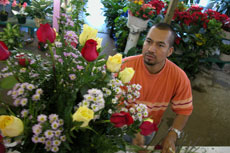Human Flower Project
The Detour
It was 50 years ago—the first date. High time for metaphysical stalking through a south London village.
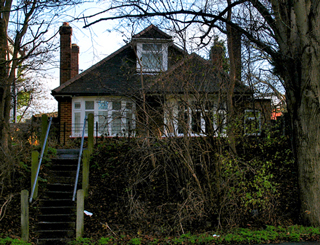
House in Orpington
Photo: John Levett
By John Levett
On the first Sunday after Christmas 1960 I went on my first date. Her name was Jennifer and she lived in Orpington. Orpington, on the cusp of south London as it moves into Kent proper. It had nothing to distinguish itself then and it still doesn’t: a once-village into which, in the inter-war years, irrupted English Tudorbethan domestic housing as it did everywhere in the home counties. Full of bankers, shipping agents, insurance salesmen, commercial travellers voting for Baldwin, Chamberlain, a stake in ‘England’s Green and Pleasant Land’ and well away from hunger marchers and the Red Tide. Orwell’s ‘Coming Up For Air’ nails them; Orpington as Lower Binfield. Growing up I felt looked-down upon.
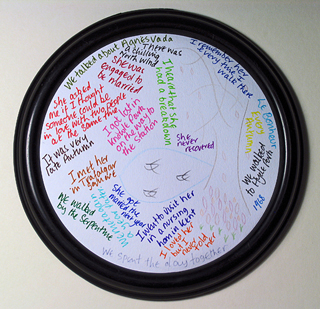 “She was married the next year”
“She was married the next year”
By John Levett
I don’t have much affection for Orpington. Jennifer dumped me about six weeks later. As I look back at the (even now) cringe-making dates, she had good cause. I cried but at least I didn’t have to go through all that palaver any more. But I did have to go though the whispers, sniggering and snatched glances—we still went to the same college.
Embarrassment passed and we got to be friends. When we went off to university we still met up during vacations and when, at the end of that decade, she had a breakdown I visited her at the nursing home in which she was recovering near Knowle Park.
We last met up on a freezing day in Hyde Park in ‘69 or ‘70. She was living in Brixton then and about to marry. I lent her Larkin’s ‘Whitsun Weddings’ and Eldridge Cleaver’s ‘Soul On Ice’ (what a team!); we said ‘Goodbye’ and left a lot unsaid.
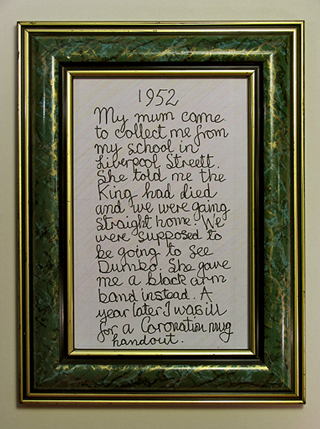 “She told me the King had died”
“She told me the King had died”
By John Levett
Over the past few months I’ve found myself thinking and (even worse) speculating on random remembrances in my early life. Last Summer I was walking along Cromwell Road in west London when light bouncing off a shop window brought back the whole of a day in 1967: my Proust moment. I set about a new project. I collected a multitude of frames from charity shops, filling them with written and drawn memories of moments for which there is no diary entry, no gewgaws, neither snap nor postcard, no theatre programme or cinema ticket. With the help of a friend I involved a number of anonymous contributors to create similar unphotographed memories. The consequence was a retreat into a past both metaphysical and concretely regret-ridden. This sort of thing can be useful as it can give fresh insights into how we are what we have become but dwelling there can be death to a fresh present.
It didn’t end there. A couple of Sundays ago, the first Sunday after Christmas, I decided to re-travel the journey of my first date of fifty years past. Now I know, am absolutely certain, that I am not the only person on the planet who has done this thing so I don’t consider myself some sort of lonely, gut-wrenched saddo. What’s more I went along armed with an art manifesto and critical rationale for so doing . So that’s alright then.
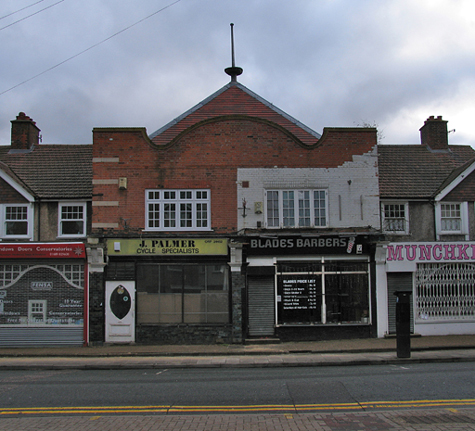
Back in Orpington
Photo: John Levett
Around six-thirty I caught the first train out of Cambridge on the Sunday morning, another down to Bromley in south London and started the six mile walk to Orpington. It’s a walk that has nothing to recommend it unless you’re carrying associations alongside. I did the usual ‘I remember that,’ ‘Whatsit used to live down there,’ ‘That’s changed,’ ‘Manfred Mann used to play that pub’ and so forth. The 1920s bus garage still stood, so too did part of the college we both went to; I remembered the health centre where the entire child population of the borough received polio inoculations (I still have the scars); various lanes and avenues recalled events of a moment (first snog, first fag, first beer, first friend). What you’d expect.
It wasn’t until I got to the recognisable part of Orpington proper that I began to question why I was doing this thing. Sure, the memory of a real moment that clearly stayed with me was the trigger but it also fitted in with the way that I (mostly) practice photography and it’s the way that photographers (mostly) practice their photography—the detour, photography by walking around. It’s photography according to, what I recently saw described as, the subconscious click. When I write ‘photographers (mostly)’ I’m not talking of Annie Leibovitz-Geoffrey Crewdson mode, rather five million Brazilian teenagers each with a phone-camera stylee. Richard Long had the revolutionary idea that ‘my walking is my art’ and I carry that idea around with me. I also carry around the personal associations and the associations of history.
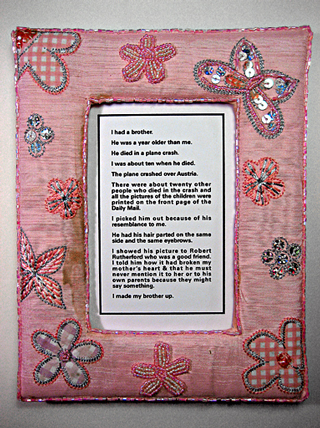 “I made my brother up”
“I made my brother up”
By John Levett
The original intention of magicking-up the apparitions and disembodied spirits of post-Christmases past gradually faded. I finished the walk, snow still lying in parts as it had then but that was mostly the only similarity. Past the inevitable Tesco, the war memorial on the roundabout, out the other end to the now-clogged relief road and there was the house. At least the bungalow, or what I guessed was the bungalow. I had a number of numbers in my head somewhere between two-hundred and fifty and two-hundred and eighty down this road but couldn’t remember which so shot them all. Trees had grown, gardens had deteriorated, walls had flaked, pathways had subsided. I stood around for five minutes and paid homage to an event and walked on.
In a real sense the object of the walk had got in the way. In the fifty years gone Orpington had changed from its controlled, anxious, reserved character of English dormitory suburb to a sort of holding-station for those in transition or for those with no exit. London’s inner-city, docklands, the bye-law housing of the east end are gentrified, gated, privatized; land assembly excludes & displaces; compulsory purchase benefits the corporate to the detriment of the public sphere. Those denied access drift to the outer suburb; the outer suburbians drift to the country.
I walked back through the High Street. I imagined the place a half-century ago and its predominately middle-class upscale clientele—the tea shops and tailors; the grocers and butchers (and graziers too); the retail banks (open at 10, closed at 4, no loans approved without an interview with the manager); modes for ladies not women. There’s a five-and-dime, down-at-heel feeling now—fast-everything, nothing permanent, everything on the brink.
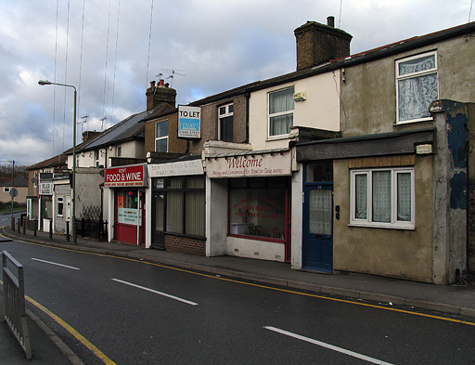
Into St. Mary Cray
Photo: John Levett
Off the edge of the High Street is St. Mary Cray. When I lived in south London, St. Mary Cray had a large Romany population which provided labour for the fruit and hop fields in Kent. Mechanization largely put a stop to that and the travelling population gradually became a settled population on locally-provided sites. Walking through the village I recalled the idea of ‘the subconscious click’—the glance that creates an imperative to record it. I notice that it’s often the phenomenon that is surviving against all the odds that draws me—the hanging-not-falling sign, the moored-not-sunken barge, the peeling-not-peeled window frame, the newsagents-not-yet-Tesco-fodder. St. Mary Cray seemed to be hanging on, not sure of what happens next, when the next road-widening starts.
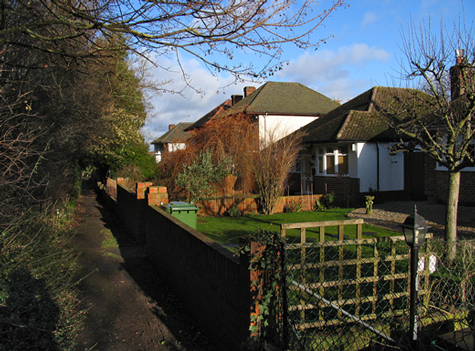
Back gardens, Orpington
Photo: John Levett
I stopped by a row of hanging-on gardens and instead of taking a shot and moving on wondered why I was going to. The answer was that they represented human aspiration. I think every garden does that but for some it’s more of a struggle. When these small homes were built in the early years of the last century there was no nearby major thoroughfare, no nearby Orpington High Street because Orpington railway station still slept in late-Victorian comfiness, no packing plants, no warehousing, no permanent revolution. It was something one could reasonably expect to stay for a lifetime and for that time to be changeless; a small piece of personal rurality within the still-rural. Trying to keep the garden perched up there was a minor inconvenience; maybe it also gave a sense of having risen above the hoi polloi on the street below. Plant the hedge, encourage the arbour, shut the door, mash the tea, put on an Al Bowlly record. Sorted. Some people thrive on constant change; most hope to survive with permanence.
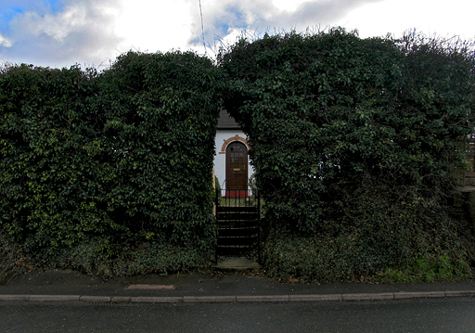
Hedge with a memory, St. Mary Cray
Photo: John Levett
The front garden is often the world’s window into your soul. I exaggerate but I’m going in the right direction. The horror of a passer-by sneering sends many gardeners rushing for the fork and trowel. I once had a front garden of roses from which a lady, having taken her children to a nearby school, frequently snipped a rose to take home; I felt complemented that nobody else’s got the same attention. There’s a chap round the corner from me whose front lawn is spotless through every season; I always pass amazed at the perfection at each stalk of that lawn. Others I’m saddened by—didn’t prepare the soil, no bone meal, no spring mulch, no hard pruning—it could have been so much more. Others I despair over—the concreted-asphalted-gravelled over car park. Bankers, lawyers, car salesmen and estate agents—no soul.
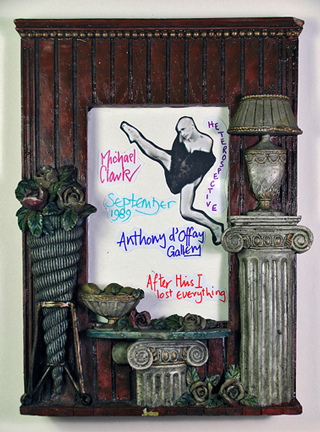 “After this I lost everything”
“After this I lost everything”
By John Levett
There’s a melancholy about these gardens, about this village tacked onto the edge of a part of the metropolis that’s only ever likely to be part of a future land-grab, a developer’s rejuvenation idea, a local authority’s wish to freshen-up. I’m glad I found it. It’s part of the detour, part of putting together a memory with a wish-memory with speculation with chippings of history. I could have walked anywhere and got the same thing. The whole day started off with fantasy and finished up the same way. I photograph what I wanted to be there and come away sure that I’d got it. Metaphysical stalking.
Later that same day …
On the train back to Cambridge I wondered if anyone in my past remembered a date with me, took a similar walk and snapped the sites. Weird. And scary.
